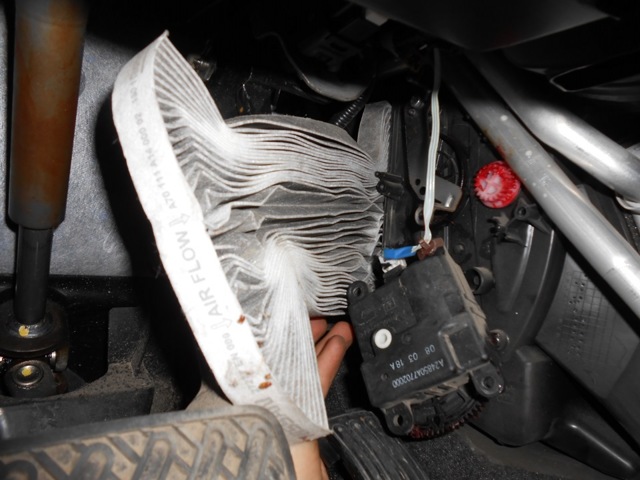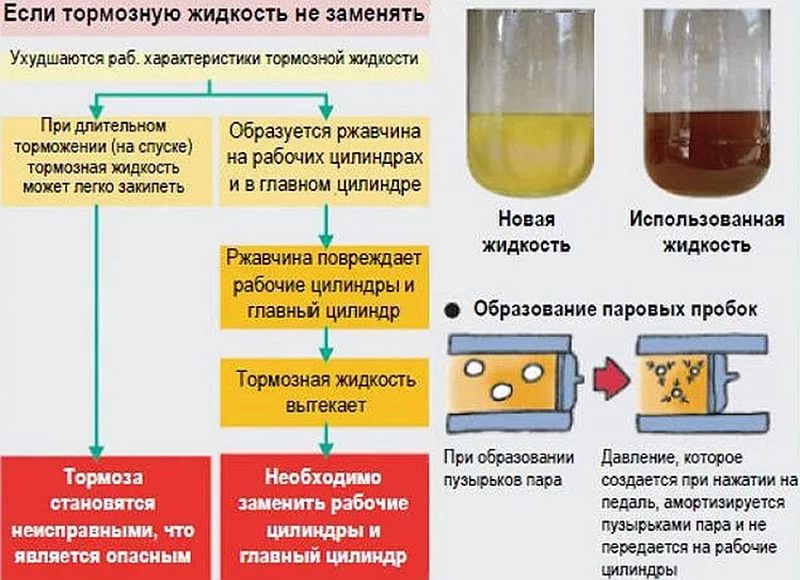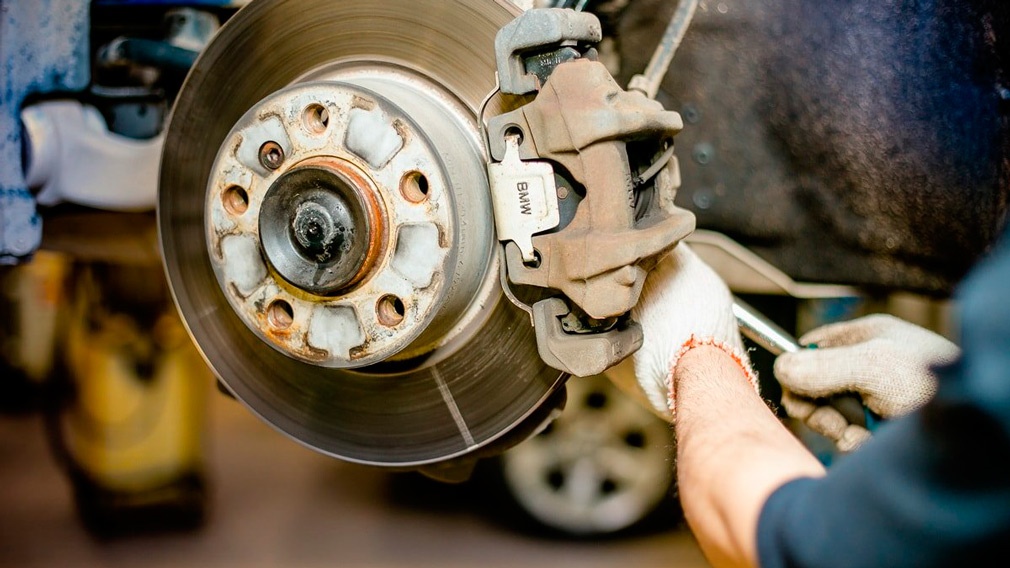
Squeaking brakes on the car causes and solutions
Content
The squeak of the brakes will not surprise either a novice behind the wheel or an experienced driver.
The sound that a car makes when braking is not necessarily due to defects in the brakes, but nevertheless annoys the driver and reduces the comfort of the ride.
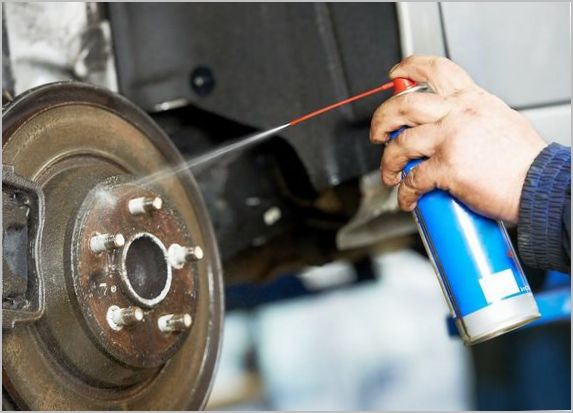
Brake device
The brake system of the car consists of two independent hydraulic circuits that simultaneously slow down the rotation of the wheels according to the principle "front right - rear left" and "front left - rear right". Additionally, the system has a brake force regulator that changes the pressure in the working cylinders of the rear wheels depending on the vehicle load.
The effectiveness of the system depends on the health of the regulator and the pipelines of the circuits.
The characteristic signs of their malfunctions are the car pulling to the side when braking, a sharp decrease in the effectiveness of the brakes and sounds from only one side.
The brake disc, made of modified cast iron, is carefully machined, balanced and mounted on the wheel hub. Its outer and inner planes are affected by brake pads installed in the caliper. The inner pad is pressed against the disc by the working cylinder. The outer pad is pressed by the caliper, moving under the force of the working cylinder along the guides.
On the working surfaces of the pads, friction linings made of high friction materials are glued “hot”.
Why do disc brakes squeak?
With significant pressing forces of the friction linings and a high frequency of disk rotation, the contact surfaces heat up and the effect of “microwelding” of the particles of the lining material with the disk plane occurs. In the next microsecond, the stuck pad breaks off and the process is repeated many times, causing the pads to vibrate in the caliper and the caliper itself to vibrate.
When the oscillation frequency decreases below 18-20 kHz, the driver perceives them as a sound, the tone of which changes depending on the deceleration of the wheels and the resonant frequencies of the entire system.
If a vehicle without ABS is braked before the wheels lock up, the brake squeal will disappear and be replaced by screeching tires.
The nature of both phenomena is the same.
Causes of the sound of the brakes
If you have been driving a car for a long time and for some time now have begun to notice a rattle and creak when braking, and annoying sounds do not disappear, but, on the contrary, intensify, there may be several reasons for this:
- The friction linings are extremely worn out, and a layer of hot-melt adhesive has entered the work, or even the friction of the metal of the pad against the surface of the brake disc has begun.
- "Squeakers" began to work, warning about the onset of wear limit. Skripun - a figured steel plate riveted to the base of the block. It is not used in all types of brake pads. When the lining is worn, it begins to contact the brake disc, warning with an unpleasant sound about the imminent need to replace the pads.
- Surface wear or buckling of the brake disc due to uneven heating. Occurs in cars with a mileage of 100-150 thousand km.
- The caliper guides are worn out, as a result of which he got the opportunity to take an "active part" in resonance to high-frequency vibrations. Most often associated with the penetration of dirt through damaged rubber guide covers.
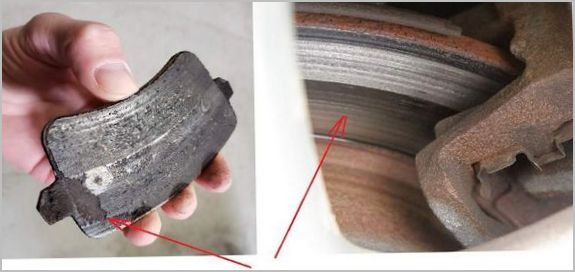
Second option. The owner received the car from a repair during which the brake pads were replaced and was surprised to hear unpleasant sounds when pressing the brake pedal.
Possible causes of creaking new pads
- The period of adaptation (run-in). New pads have not yet rubbed against the worn surface of the disc. After a short run, the noise will disappear by itself.
- Poor quality parts or manufacturing defects. Pads of a dubious manufacturer, purchased for reasons of economy at a low price.
Original spare parts are expensive and sometimes very expensive. When buying a cheap non-original, pay attention at least to the appearance of the product and completeness. In the pursuit of profit, the "gray" manufacturer may not remove the necessary chamfers, not attach the necessary fixing parts, and even save on copper chips, which are part of some friction mixtures.
- Marriage in the work of repairmen. It is quite possible that the "experts" who shamanized the car were too lazy to install anti-creak plates, fixing brackets or spring latches. Even the absence of special lubrication on the non-working side of the pad can cause extraneous sounds.
If the manufacturer has provided for the need to install the mentioned parts, they will be in the set of pads you purchased. We repeat the advice not to buy cheap dubious products with an addition: do not use the services of unscrupulous specialists.
Often the "squeak effect" appears in cold and damp weather and disappears after the brakes warm up. This is explained, apparently, by the properties of the material of the brake pads.
Manufacturers' measures to prevent squeaking
Auto manufacturers, of course, use all the measures and techniques available to them to make the brakes of a new car “silent”.
The simplest solution is to apply a thin layer of special mastic on the working surface of the brake disc, which absorbs vibrations and does not impair frictional properties.
The layer of mastic, of course, will not last long, but this time is quite enough for running in the pads.
Another solution is to give the friction lining of the pad a special shape by making gentle bevels or asymmetrical slots on the working surface.

The most reliable way is to limit the free vibrations of the brake pad.
To this end, the designers have provided anti-creak gaskets between the piston and shoe, special lubricants between the gasket and piston.
Sometimes, to dampen vibrations, curly spring pads are used, which are attached to the legs to the non-working side of the pad and absorb vibrations between the pad and piston and the pad and caliper guide.
Often, stamped elements are installed on the internal brake pads, which are included in the recesses of the pistons and reduce mutual movements that generate noise.
Vibrations of the pads relative to the caliper guide can be damped by curved spring clips, which also prevent the pads from jamming in the working position.
Harmful vibrations are absorbed very well by damper bushings on caliper guide pins or by installing calipers on some kind of silent blocks.
Along with these fairly simple solutions, more complex ones are also actively used - ventilated brake discs and discs with temperature compensator slots on the working surfaces, which reduce the likelihood of deformation during overheating.
Causes of squeaky drum brakes
The design of drum brakes is simpler than that of disc brakes; the parts used do not require complex manufacturing technologies. This is precisely what explains today's fairly widespread use of drum mechanisms, especially in small and medium class cars.
Braking efficiency is lower than that of disc brakes, so drum brakes are installed only on the rear axle.
Causes of the squeak:
- New, unworn pads.
- General pollution of the brake mechanism by wear products of the linings.
- Resonant vibrations in the "pads - drum" system, transmitted to the brake shield.
- Hit of a pebble or other object in the gap between the drum and the brake shield. (In this case, the sound is heard when the vehicle is moving, whether the pedal is depressed or not.)
To diagnose and eliminate the causes, you must:
- dismantle the wheel and brake drum;
- thoroughly clean, rinse and blow out the elements of the brake mechanism.
- remove the anti-creak springs ("soldiers").
- retracting the pads to the outside, clean and lubricate with a special viscous refractory grease the fulcrum of the pads on the brake shield;
- anti-creak springs, their fingers and covers, clean and lubricate with lithol, assemble and install in place;
- lubricate the attachment points of the pads on the support pins;
- install the brake drum, mount the wheel.
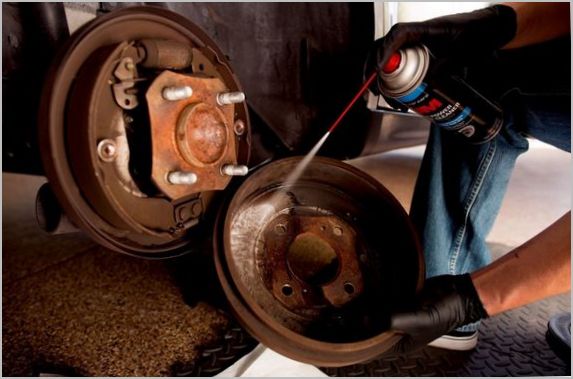
When undertaking the laborious work of "silencing" drum brakes, it must be borne in mind that there are cars for which "vociferous" brakes are a "signature" feature, and not a defect.
For example, almost all UAZ products.
Results
The best way to rid the car of congenital and acquired sores is to service and repair it at the service station of an authorized dealer, which gives guarantees for the completeness of the work performed and the quality of the parts used.
Before starting an independent invasion into the responsible braking system of your own car, along with professional, theoretical training is necessary.
Having studied someone else's experience on specialized sites, you will not only gain knowledge, but also save a lot on mistakes.
In any case, you should not trust advertising statements about the excellent quality of the X manufacturer's products, but purchase only those kits and products that are listed in the parts catalog of your machine.
Don't skimp on your own safety.
